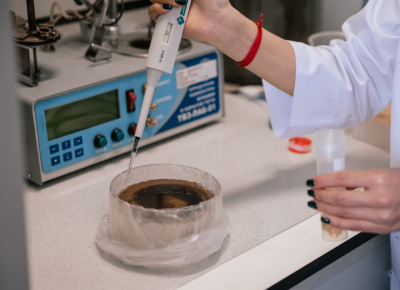Scientists have transformed paper mill waste into a valuable petrochemical feedstock
Scientists from the Gubkin Russian State University of Oil and Gas (National Research University), together with the Center for Environmental Industrial Policy at the Russian Ministry of Industry and Trade, have developed a method for converting toxic waste from the pulp and paper industry into a valuable petrochemical feedstock – a plasticizer for the production of polyvinyl chloride (PVC).
A plasticizer is a substance added to PVC to impart elasticity. Tricresyl phosphate, a plasticizer currently used in the production of rubber, leather, synthetic fabrics, and other materials, is currently used in the industry. It is made from natural raw materials, making the product quite expensive. The method developed at Gubkin University has made it possible to obtain an equally effective plasticizer from tall oil – a waste product generated at factories during the processing of plant materials.
"The depletion of natural resources is driving the search for new raw materials for the oil and gas industry." It is especially important to find uses for waste that is not currently recycled at all or is not recycled effectively. We set the goal of studying fat-containing waste. Currently, almost a fifth of it in Russia—22%—ends up in landfills and is irretrievably lost as a potential raw material,” noted Stanislav Meshcheryakov, professor of the Department of Industrial Ecology.
According to Rosstat, over 100 million tons of fat-containing waste are generated annually in the country.
The scientists studied various types of fat-containing waste from the food and pulp and paper industries. In the first stage, ethyl and butyl esters of fatty acids were isolated from the samples. The structure of the obtained compounds was confirmed using IR spectrometry. In the next stage of the experiment, the esters were tested as plasticizers for compatibility with polyvinyl chloride using the capillary method. The study showed that ethyl ester from tall oil has the same plasticizing properties as tricresyl phosphate.
"The material synthesized in the experiment can serve as a full-fledged replacement for plasticizers made from natural raw materials, which will conserve fossil resources and simultaneously solve the problem of hazardous waste disposal," Stanislav Meshcheryakov emphasized.
During the experiment, the researchers also studied the toxicity of the original waste and the products synthesized from it. A biotesting method confirmed the environmental effectiveness of the recycling process: the process reduced the environmental hazard of the substances.
"The developed method for recycling fat-containing waste is very promising. It allows for the production of plasticizers that can replace some of the original natural raw materials in the oil and gas industry. Given that some companies are currently forced to purchase plasticizers abroad, this domestic development is particularly relevant," Stanislav Meshcheryakov added.
In the future, the scientists plan to explore the possibilities of recycling other types of fat-containing waste.

